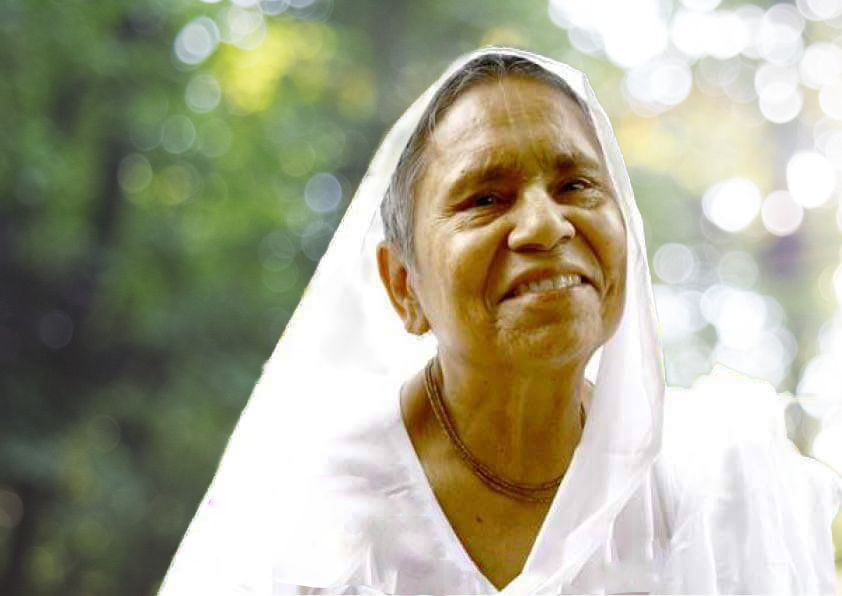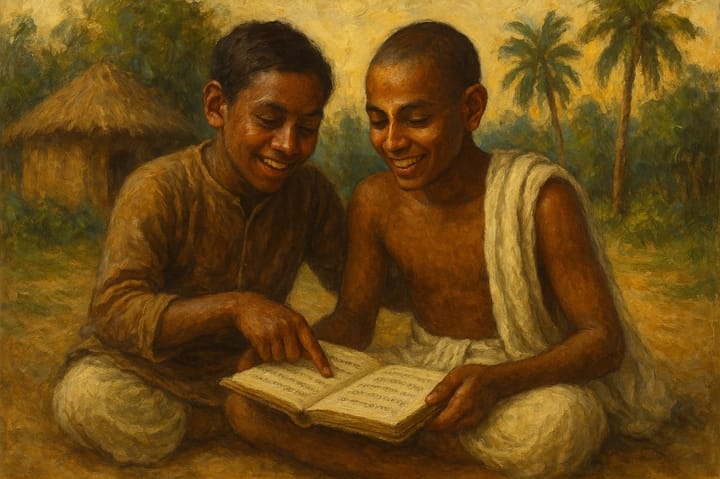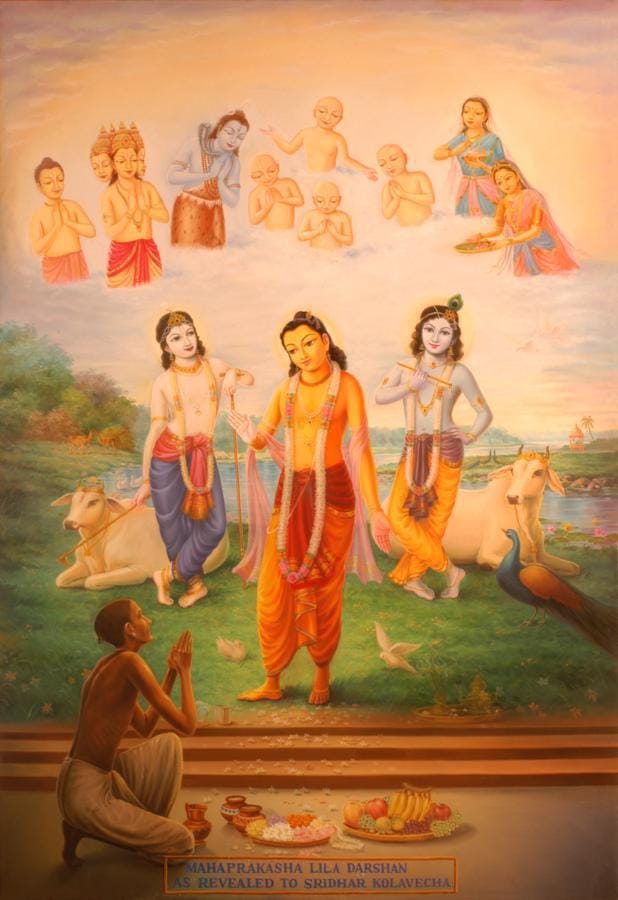Remembering Śrīmatī Umā Dīdī

Yesterday we had a wonderful viraha-utsava in honor of Śrīmatī Umā Dīdī, absorbing ourselves in her many inspiring and heart-melting glories: her humility, her honesty, her boldness in crushing apasiddhānta, her addiction to hari-kathā, her intense sādhana, her happily enduring any kind of difficulty, her motherly warmth, and on and on.
But what was behind these qualities? What factor made them so glorious?
Guru-niṣṭhā – her very essence
The theme running throughout everyone’s glorification was her unprecedented guru-niṣṭhā in Śrīla Vāmana Gosvāmī Mahārāja, Śrīla Trivikrama Gosvāmī Mahārāja and Śrīla Gurudeva. It completely defined who she was. Every cell in her being was dedicated to them. She was their sheltered daughter, so much so that you cannot think of Umā Dīdī without thinking of them. It was this intense connection to them that gave depth and beauty to all her other qualities.
My Paramagurudeva said:
From our mundane perspective, we may also detect the qualities of a Vaiṣṇava that are listed by Śrīla Kavirāja Gosvāmī in persons who are not Vaiṣṇavas, such as the followers of varṇāśrama-dharma. In truth, however, it is impossible for a non-Vaiṣṇava to possess the qualities of a Vaiṣṇava. Whatever is synonymous with the word vaikuṇṭha, which denotes the abode of the Supreme Lord, is not limited, temporary and gross like the objects of this world. But everything else indicated by the words of this world is entirely worthless. Therefore, only extremely superficial observers will think that the qualities of a Vaiṣṇava can also be found in non-Vaiṣṇavas. For instance, Śrīla Kavirāja Gosvāmī has listed magnanimity (vadanyatā) as a Vaiṣṇava quality. An ordinary person can be “magnanimous” according to the conventional meaning (ajña-rūḍhī-vṛtti) of the word. But this adjective cannot be applied to anyone except a Vaiṣṇava when it is given its truest and most profound sense (vidvat-rūḍhī-vṛtti).
(“One Must Correctly Identify A Vaiṣṇava” by Śrīla Bhakti Prajñāna Keśava Gosvāmī Mahārāja translated by Rays of The Harmonist team)
Yesterday, many stories were told about Umā Dīdī’s sometimes confronting honesty and lack of duplicity. What was different about Umā Dīdī’s or any Vaiṣṇava’s honesty?
Someone may read my previous Ekādaśī Eve postings and think, “Madhukar is also pretty honest. He publicly admitted to shameful things about himself.”
What inspired me to try to write so honestly? Well, I read a book by Julia Cameron called “The Right to Write”. She talks a lot about how to be vulnerable and honest in writing. Other accomplished writers say the same thing. And really, what do I have to lose? People will appreciate my honesty and maybe even praise me for it. Plus, it will make whatever I write a lot more interesting to read. That’s an example of the motivated honesty of this material world.
But where was Umā Dīdī’s humility and honesty coming from? Śrīla Bhaktivinoda Ṭhākura writes, “sambandha jāniyā, bhajite bhajite, abhimāna hau dūra – as I come to know my sambandha (relationship with Kṛṣṇa and His near and dear) and continue to engage in bhajana, my pride and false ego will be thrown far away.”
Because she was so firmly established in her relationship with her gurudevas, she genuinely did not care what anyone thought of her. True humility only comes through this depth of connection. The popularity she gained from traveling the world and receiving profuse adoration and praise did not affect her. She remained the same old down-to-earth, unpretentious Umā Dīdī. She once said to a friend of mine, “Sometimes people glorify me, and when I try to make them understand that the qualities they see are not really there, they say, ‘O Umā Dīdī, you are so humble.’ ” At that point, Umā Dīdī threw her hands up in the air, exasperated, and said, “What to do?”
She didn’t want anything from anyone, so she had nothing to lose from speaking out when she saw anyone – no matter who it was and what position they held – stray from the teachings of our guru-varga. Standing behind the mic, she would publicly correct prominent persons in front of hundreds of devotees. You never had to wonder what she was thinking about you.
The most intimate connection
What is the greatest, most complete way śrī guru showers his affection and mercy upon us? Through what medium do we gain the most intimate connection with him? His hari-kathā. Vaijayantī-mālā Mātājī once heard Śrīla Gurudeva say, “I will not speak anything more intimate to you in a private darśana than the hari-kathā I speak when I give class.” Umā Dīdī’s life breath was that hari-kathā.
In his homage to Umā Dīdī yesterday, Sundar Gopal prabhu explained how, as a teenager, he would travel to Śrī Keśavajī Gauḍīya Maṭha in Mathurā to see Śrīla Gurudeva. There, in class, he heard Śrīla Gurudeva speak a most beautiful description of Śrī Kṛṣṇa going into the forest in the morning with all of His friends and how upon hearing His flute song, everything in Vraja adopts an opposite nature. The Yamunā becomes still or flows backwards, hard stones become soft like butter, and things that are animate, like animals, become paralyzed. The birds in the trees look like toys; they are completely still. Then Śrīla Gurudeva said the ears of the cows become raised to be like cups by which they drink the nectar of Kṛṣṇa’s flute.
That is how Sundar Gopal prabhu remembers Umā Dīdī. He saw that in every single lecture of Śrīla Gurudeva’s that he attended, she would sit right at the front, having arrived well before anyone else. And throughout the class, she would gaze at Gurudeva, transfixed and drinking his every word.
Just see my Śrīla Gurudeva’s glorification of this quality in her:
Without the mercy of Bhagavān, especially without the mercy of the devotees, the proclivity for non-duplicitous hari-bhajana cannot arise. You are very fortunate [in this regard]. Enthusiasm and eagerness for hearing hari-kathā is indeed the foremost path by which one can enter the realm of transcendence. Since, such eagerness has arisen within you, you will therefore be able to receive the mercy of Hari, guru and Vaiṣṇavas.
Bhagavān, who is full of compassion, has given you ample opportunities to hear hari-kathā and you, too, are endeavouring to benefit from this. This does not become a possibility for everyone. Gradually develop your inquisitiveness while hearing hari-kathā, and continue to perform hari-bhajana with increasing enthusiasm and conviction.
Written to Umā Dīdī on 1 Febrauary, 1976 (Read full letter)
You are devoted and faithful, that is why all the Vaiṣṇavas have great affection for you. It is a very auspicious sign that you have such determination, conviction and one-pointedness in bhakti-sādhana.
Written to Umā Dīdī on 26 December 1971 (Read full letter)
I witnessed this quality with my own eyes. No matter who in the maṭha was speaking hari-kathā, Umā Dīdī would sit in that person’s class, listening attentively. Even if she couldn’t understand the persons accent and even if no one else was in the class, she would sit and listen.
Also, she would only speak whatever she heard from her gurudevas; nothing else.
Happily enduring hardship in service
Śrīla Vṛndāvana dāsa Ṭhākura states, “jata dekho vaiṣṇavera vyavahāra duḥkha, niścaya jāniho seho parānanda sukha – whatever ordinary suffering one perceives in a Vaiṣṇava, know with certainty that it is actually the utmost ecstatic bliss” (Śrī Caitanya-bhāgavata, Madhya-khaṇḍa 9.240).
When you have genuine love for someone, any hardship you undergo for that person becomes the greatest joy.
In 2018, Gaura Pūrṇimā day in Śrī Navadvīpa-dhāma, we made a set for interviewing devotees for “The Gift of Śrī Caitanya Mahāprabhu”, a documentary about Śrīla Gurudeva’s teachings. We could not find a quiet place to record, so we set everything up on the top floor of the C-building.
Umā Dīdī happily agreed to be interviewed. We walked with her over to the C-building and she started slowly climbing the stairs, using the hand rail to pull herself along. We offered to carry her on a chair, but she refused, and continued to climb, step-by-step. Arriving at each landing, she would stop for a moment, get back her breath, smile, and then continue on, step-by-step, up the next set of stairs, where she would again stop, get back her breath, and then continue. She struggled like this up six long rows of stairs. It was a fasting day. She was 85-years-old. That was five years ago, and her example of determination has helped me in more ways than I can describe.
Umā Dīdī’s dedicated, long-time sevikā, Raṅga Dīdī, mentioned how on festival days, Umā Dīdī would plan and prepare everything for cooking. Standing for a long period at a stretch caused her legs to feel heavy and sore. But she would ignore the pain and continue standing for hours at a time, cooking dozens of preparations, especially on the Vyāsa-pūjā and tīrobhāva tithis of our guru-varga. Only after all the cooking was completed would she give an indication of her condition.
“Tomāra sevāya, duhkha haya jato, seo to’ parama sukha – in the course of serving You, whatever difficulties may come are indeed the topmost joy”
(Śaraṇāgatī, “Atma-nivedana” 4, Śrīla Bhaktivinoda Ṭhākura).
My true well-wisher
On Rāma Navamī, 2010, I received saffron cloth from Śrīla Gurudeva, who instructed me to go to all the Vaiṣṇavas and request their blessings. I went downstairs to where Tīrtha Mahārāja was giving class, and the first person I saw, sitting on a chair at the back of the room was Umā Dīdī. She lovingly gave her blessings and instructed me to be a strong brahmacārī of Gurudeva. Every interaction I ever had with her revealed that she only wanted me to become a better disciple of Śrīla Gurudeva and fully sheltered at his lotus feet. Nothing else. Actually, this is all she wanted for everyone.
My Paramagurudeva said:
“May everyone in the world, not just me, become the servant of my guru.” A genuine disciple should desire such an attitude. To serve śrī guru, a real disciple gathers the best flowers [souls] in the world and places them on his offering tray. It is this self surrendering tendency that is guru-pūjā, or sevā. Such a tendency is not of this world, being born of Vaikuṇṭha ideals.
(“Śrī Guru-pūjā” by Śrī Śrīmad Bhakti Prajñāna Keśava Gosvāmī Mahārāja, 3 Feburary, 1961, translated by the Rays of The Harmonist team)
Her traveling and preaching had a unique power, despite her age and her simple English. She had a way of entering a home or a community and becoming a beloved member. Like Śrīla Sanātana Gosvāmī, she would make sweet and genuine relationships with everyone, cooking for them and talking affectionately to all, including the children and other family members. Then, she would deliver precise Gauḍīya conceptions, speaking exclusively what she had heard from her gurudevas. Her words had profound impact, being imbued with her deep faith and staunch practice. They would enter the heart deeply, because, as Lalit-kiśorī from Wales said, she had established a real, proper relationship with everyone. Externally, one may think her preaching to be small and simple, but in reality, because she actually cared for others and because of the reasons just mentioned, her impact was profound. She exuded guru-niṣṭhā, and anyone in her presence would feel an increase in their own guru-niṣṭhā.
I know very well that right now, she would not be particularly pleased with my glorifying her. The only offering she would gladly accept from me today is my sincere endeavor to fully embrace the instructions of Śrīla Gurudeva. Daily, I fail to follow even the most basic instructions of Gurudeva. I’m constantly getting knocked down by countless desires and falling head first into the muck of temptation. But seeing Umā Dīdī’s shining example gives me the hope that I too can one day lift up my head, stand on my two feet and with great determination and confidence, begin climbing the steps, one at a time, step after step, after step.
I pray to one day be able to follow in her footsteps and thus come closer to the lotus feet of my Śrīla Gurudeva.
Śrīmatī Umā Dīdī ki jaya!



Comments ()